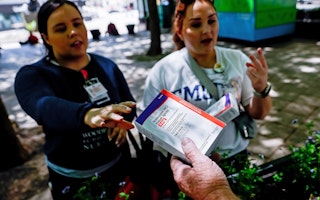Why the UN’s Sustainable Development Goals Need Good Drug Policy
By Ursula Sanchez
Internationally, the drug policies created over the past 50 years have been a bust. The emphasis on prohibition and security has done little to control the production, transit, or consumption of drugs. These policies have failed because the factors driving thousands of people to join illicit drug markets are deep and structural. Try as you might, you can’t just police them out of existence.
Poverty, gender inequality, rural development and land rights, corruption and weak rule of law—these are the factors that fuel the illicit drug market. They’re also development issues—the very issues tackled by the UN’s Sustainable Development Goals (SDGs), which were adopted last week. This is why the SDGs must incorporate reformed drug policies. Neglecting a developmental approach to drug policies has led to myriad consequences, from environmental degradation and crime to destabilization and displacement.
In production countries, prohibitionist policies are based on the assumption that by reducing the supply of drugs, you can drive up prices and, in turn, drive down demand. But this approach doesn’t take developmental factors into account.
For instance, in Latin America around 70 percent of women in prison face charges of nonviolent “micro-trafficking” activities. Women are prone to engage in these activities because of the persistent gender inequality in underdeveloped countries. Single mothers with no education often find in these activities a way to support their families, working as low-level dealers or “mules” to transport drugs into prisons or other countries.
Likewise, for poor farmers with no access to land, the cultivation of coca leaf, opium poppy, and cannabis presents numerous benefits. Drugs are nonperishable products that are easy to grow in marginal terrain and poor soil, and with limited or no irrigation. Therefore, a black market for these highly cost-effective commodities is inevitable in lieu of appropriate development solutions.
At the same time, the environmental impact of the illicit cultivation of drugs is severe. In the Andean and Amazonian regions, each hectare of coca leaf or opium poppy cultivation causes the deforestation of two or three hectares of forest, destroying ecosystems and affecting biodiversity. Making things worse, the eradicating chemicals used in aerial fumigation destroy vegetation and animal habitats, not to mention negatively affect human and reproductive health.
All of these problems are duly amplified by the “balloon effect,” in which law enforcement keeps drug producers and traffickers on the run, leading to even more environmental degradation as they set up shop elsewhere.
By working towards the accomplishment of the 17 SDGs and their 169 targets, most of the structural conditions driving thousands of people to join the illicit drug markets can be addressed from a sustainable perspective—particularly the ones related to poverty and food security, gender equality, health protection, environmental sustainability, access to justice for all, and building effective, accountable, and inclusive institutions.
Smarter drug policies can help accomplish these goals by focusing on the well-being of affected populations. By reforming our approach to drugs, we can pave the way for more sustainable development for everyone.
Ursula Sanchez is an intern with the Open Society Global Drug Policy Program.


